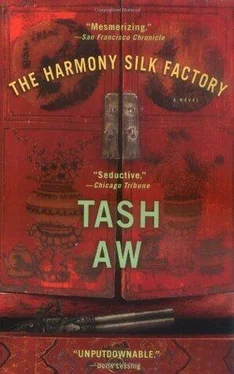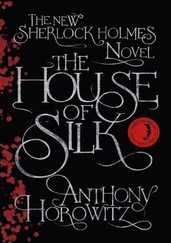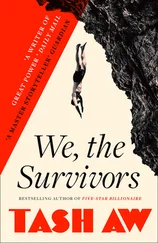THE BEST THING ABOUT THE TROPICS,” I said as I watered the orchids, “is that the seasons never change. There are the monsoons, of course, but there’s never a time when the garden becomes a frozen graveyard. We don’t have to worry about dead leaves littering our perfect lawns or the ornamental ponds freezing over.”
“I think autumn in England is very beautiful,” said Gecko without looking up from his newspaper. “I’ve seen pictures of it, the mountains all covered in red leaves. Very nice.”
“I think you mean New England,” I said, knowing that the latest issue of the National Geographic contained a photographic feature on the people of Vermont and their ghastly faux-naïve clapboard houses. “That’s in America.”
Alvaro put down his paper and took off his glasses to look at me. I was hanging the last of the orchids on the ceiling of the verandah. I had bought them from the market early that morning — ten little clay pots, each bearing a different specimen. Hanging from the low eaves, they formed a half-curtain that ameliorated the view of the as-yet barren lawn. “I must confess,” he said, with none of the contrition of a confessional, “that I have always wanted to go to England in the winter. There’s something about the cold weather that’s always fascinated me. Frosty air seems so mysterious. Sometimes it gets too hot here, you know, just too damn bloody hot, and I wish I could just fly away to somewhere cold. People are nicer in cold countries, aren’t they? More civilised.”
“I shan’t disabuse you of that notion,” I said. “If you’re ever unlucky enough to find yourself in an English winter, you will quickly learn the truth for yourself.”
“Oh look,” Gecko trilled, straightening his newspaper for emphasis. “That man has died, the one everyone said was a gangster. Johnny Lim — look, there’s an obituary and a little article too.”
“Don’t slander him — he was a war hero, you know. Where’s the article?” Alvaro said, flicking through the pages of his own paper. “Ah, here. ‘The famous business tycoon and community figure Johnny Lim passed away yesterday aged seventy-seven. Mr. Lim was a highly respected member of the community in Ipoh and the Kinta Valley. His trading company, the Harmony Silk Factory, became well known throughout the country, but although its interests became diversified, it remained faithful to its roots. In the fifty years that Mr. Lim ran the company, it never left its original site on the banks of the River Perak, where it was once the centre of commercial activity in the Kinta Valley. Mr. Lim set up the Harmony Silk Factory towards the end of the Second World War, defying the Japanese authorities to establish what would quickly become the most prominent privately owned business concern in the Valley. No other company flourished as the Harmony Silk Factory did under the Japanese. Most observers attribute its success to Mr. Lim’s bravery in facing the Japanese, particularly the chief administrator of the Kempeitai, or secret police, Kunichika Mamoru, the so-called Demon of Kampar. The two men had numerous meetings, during which it is believed Kunichika attempted to coerce the respected community leader to aid in Japanese military efforts. These meetings were fruitless, and the two men established an uncomfortable respect for each other, one that saved the Harmony Silk Factory and its many workers from the fate that befell many other Chinese businesses during the war. Rumours of Mr. Lim’s collaboration with the Kempeitai were rife but never substantiated.
“ ‘Mr. Lim was the son-in-law of the scholar and industrialist T. K. Soong, who died during internment by the Japanese during the war. Many believe he was a victim of summary executions ordered by Kunichika. Mr. Lim married Snow, the only daughter of T. K. and Patti Soong. She died in childbirth in 1942; they had one son, Jasper, who survives Mr. Lim. The funeral will be held at the Harmony Silk Factory on Monday 17th.’ ”
Gecko said, “That doesn’t tell you anything about the man. It doesn’t say he was a Communist, for example.”
“Nor does it give you details about his heroism in the war,” said Alvaro.
“Or that he was a goddam collaborator. I don’t suppose it matters now,” said Gecko. “It was so long ago.”
“Peter, did you ever come across Johnny Lim?” Alvaro said. “You spent a lot of time in Perak just before the war, didn’t you? I remember you saying that you knew the Kinta Valley quite well.”
“He’s an Englishman,” Gecko said. “Englishmen didn’t mix with local people back then.”
I poured water onto a flame-coloured orchid, watching beads of moisture collect on its sinuous leaves. “No,” I said, “I never knew him.” I put the watering can on the table and went back to my room.
I WAS DETERMINED that my birthday party would be a riotous success. Johnny and I spent many hours clearing the chosen site of debris. With a shovel and a pick-ax we flattened the smallest undulations on the surface of the soil; we filled in depressions and poured sand onto the boggiest patches of earth. Straggly shrubs were cut down and all offending weeds hacked to the ground with Johnny’s parang. We assembled a camp table which we brought from the boat, placing it so that each diner would have a view of the ruin. With surprising ease, Johnny built a rudimentary but perfectly sturdy bench with some logs he found. We talked about the kinds of food the jungle could offer us — some root vegetables, possibly an edible flower or two, fish from the sea in abundance. Other animals, we decided, would not be on the menu. Birds were too difficult to snare, Johnny said, and the only mammal we had seen was an anaemic macaque sitting dejectedly in a seaside tree. Johnny was certain, however, that snakes and lizards would be easily caught. He drew pictures in the sand of the simple traps he would use, and assured me of the delicacy of such prey; but my stomach instantly felt uncomfortable at the thought of a reptilian dinner (mon Dieu: civet de vipère!) and I convinced him that we did not need such exotic meat. I showed him the bag of flour that I had found amongst our rations.
“What are you going to do with that?” he asked.
“I shall make bread,” I announced.
“How?”
“I honestly don’t know,” I replied, watching him convulse with laughter.
All this time no more was said about Kunichika.
The day before the party I left Johnny at the site. I said, “I’ve left something back at the camp, something I need — a damask tablecloth I’ve brought with me in my luggage. Do you mind terribly if I retrieve it? I shan’t be gone long.”
“You go ahead. There’s something I need to do here anyway,” he said, somewhat hesitantly. For a moment I wondered if I should abandon my plan, but I held my nerve. Courage, mon brave. “See you later,” I said.
I ran back to the camp, gambling that Snow would not be there. It was a foolhardy thing to do, but I had to have her diary. I had seen her embark on a walk with Kunichika earlier, and since their strolls tended to be long and leisurely, there was every chance that they would not have returned. I slowed to walking pace as I approached the camp, shortening my stride to appear as casual as possible. Who knows — Honey may have been lurking. I paused, listening for sounds of movement, but there was nothing. I sauntered into the camp, hearing the soft slush of my feet on the sand.
“Peter,” a voice called. It was Kunichika, kneeling beside Snow’s camp bed. His knees were buried in the soft sand but he held his torso erect, hands on hips. He spoke in a bright and overfriendly voice. “I thought you were off somewhere with Johnny.”
“I forgot something. What are you doing over there?”
Читать дальше
Конец ознакомительного отрывка
Купить книгу












